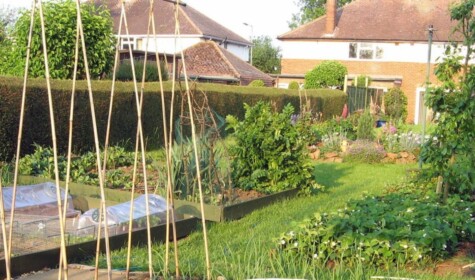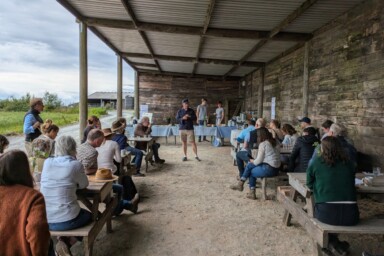Gardening journalist, Kim Stoddart examines the grow your own phenomenon that has emerged as a result of fears around food security since the pandemic lockdown.
In the days leading up to the restrictions (and ever since), there has been a sheer frenzy of interest in fruit and vegetable growing as people seek to turn over their back gardens, patios, windowsills (and indeed any available space) to home food production. The seed companies have been so inundated that there have been many reports of websites freezing, as they struggle to cope with the sheer demand for orders.
The panic buying has moved from spaghetti and tinned tomatoes into seed and compost it would seem…
As someone who has been diligently writing away, trying to encourage organic home fruit and vegetable growing for years, even I have been taken back by the tsunami-level wave of interest we’ve seen. If you’ll pardon the pun, it’s a seed of hope that in such challenging times, so many are seeking down-to-earth, nourishing respite where they can. The move into growing your own food is a hugely positive step on a multitude of levels right now and I believe, offers the potential for a more sustainable food system and society post-pandemic.
I know I’m speaking to the converted here but concerns around food security have long been valid. As renowned food policy expert, Tim Lang writes in his book, Feeding Britain, released pre-coronavirus: ‘The UK is, de facto, facing a wartime scale of food challenge.’ He details a delicate, massively ‘just-in-time’, supply chain which leaves us open to the will of international markets and which is unsustainable in every sense. As the pandemic continues to unfold in real time, the threats become enhanced manifold.
The new ‘Dig for Victory’?
As we are urged to hunker down and develop a war-like spirit to see us through the current heavily restricted circumstances, it’s probably no coincidence that there seems to be a ‘Dig for Victory’ movement unfolding. Certainly, food is set to play an ever-important role over the weeks and months ahead as we try to fill our lockdown time as productively as possible. As highlighted by commentators in Italy (who are a few weeks ahead of us in their restrictions), mealtimes take on a whole new level of significance when you are forced to stay at home. Gardening and picking produce with which to cook, are set to do the same.
As we are bombarded, every day now, with death counts and the latest lockdown news, growing some of your own food is also a way of taking back some control when everything else feels so incredibly fluid and out of balance. The undoubtedly necessary but also all-consuming pandemic restrictions have cut so deeply into our existence, slicing apart the everyday freedoms we previously took for granted – going out to work, visiting friends and shops, a walk to a busy crowded market or grocery store. With these all displaced and boxed away into isolation, it’s time to take a long hard look at what was previously considered normal and ground ourselves as best we can for whatever lies ahead. No wonder growing produce offers such appeal. It strips us back to the basic level of Maslow’s hierarchy of needs (food and shelter) and offers nurturing and purpose therein.
The national organic gardening charity, Garden Organic has seen a surge of membership requests in the past few weeks as people seek advice on digging out their front lawns to grow produce. Their CEO, James Campbell told me: ‘Growing your own food is more important than ever right now. Firstly, there are the obvious practical benefits – anything you can grow yourself will help take the strain off our food supply system, reduce potential visits to a supermarket and provide you with fresh nutritious fruit and veg to help keep you healthy. But also learning to provide for yourself is empowering, even if it’s just a pot of herbs or some cut and come again lettuce leaves on the window ledge. Carrying out practical and methodical tasks can help the mind let go of uncontrollable anxieties. And, of course, it connects you directly to nature, which is proven to have a significant impact on mental health in people young and old.’
Building resilience from the ground up
Becoming less reliant on buying in all your fresh produce is indeed a very sensible move. As is learning to grow and eat more seasonally where you can. Being able to buy whatever we want and when we want, with our expectation of say sun-ripened tomatoes on the vine even in the depths of winter, hasn’t done us any favours in the resilience stakes. As a customer service representative from one of the major supermarkets revealed to me recently, it’s the ‘must have’ ones, as she called them, that have been struggling most with the gaps in stock, abusing supermarket staff because they can’t get the exact ingredient they looking for. An older generation that remembers post-war rationing, perhaps has fewer exacting expectations. That we have been here before, is something to make note of.
How is the industry coping with enhanced demand?
Smaller companies like Real Seeds report they’ve had 400 people an hour trying to book seed purchases, when their capacity for orders is 600 per week. At the time of writing, new orders appear to be on hold. Suttons Seeds and Dobies have incorporated a queuing system on their websites, stepping up their production of plants at their nursery in Devon to accommodate the demand. Their Managing Director, David Robinson, told me, ’Unsurprisingly, this has put some pressure on our staff, but we’ve been doing our best to get orders delivered as quickly as possible. It’s been good to be able to confirm that it is possible to grow large volumes of plants in peat-free compost according to organic principles. Some of the biggest increases in sales have been in lettuce seeds, presumably because of the speed from seed to plate, but tomato, courgette and runner bean sales also increased so people are prepared to wait for their gratification it would seem. Sales of raised beds and compost have unsurprisingly also jumped in recent weeks.’
What does this mean for the future?
There was a mental health crisis in the UK before all of this hit, so goodness only knows the long- term ramifications for our wellbeing as a nation post-pandemic. There have been many studies over the years into the therapeutic benefits of gardening for both health and mind. Sticking your hands in the soil and embracing the, let’s face it, magical joy of coaxing a seed into life, in a plant that provides you with food, is nurturing in the extreme. As well as putting food on your table, it provides a muddy fingered, down-to-earth connection that makes one feel good and provides an essential link to the natural world that is for many, sorely missing. One can only hope that this wave of newbie gardeners carries on regardless, once we emerge from this crisis, blinking into the brave new greener world ahead of us.






